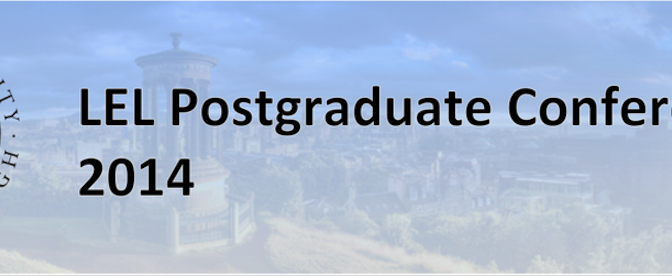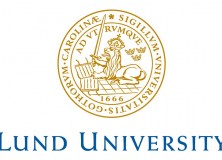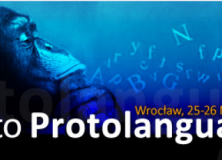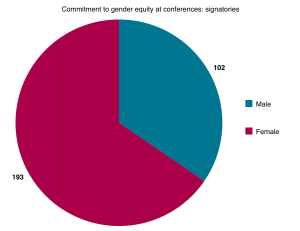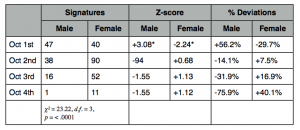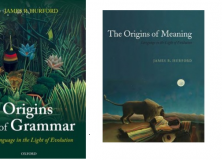
Jonas Nölle, Peeter Tinits and I are going to submit a workshop proposal to next year’s Annual Meeting of the Societas Linguistica Europaea (SLE), which will be held in Tallinn from August 29th to September 1st, 2018. We thought this would be a nice opportunity to bring evolutionary linguistics to SLE – and a also a good opportunity to discuss novel and innovative approaches to language evolution in a condensed workshop setting.
Please note that there will be – as usual at SLE – a three-step selection process:
Step 1: You submit a 300-word abstract to us (the organizers: newdir.langev@gmail.com) by November 10th. We then select up to 12 papers that we include in our workshop proposal. As we want the “New directions” in our title to be more than a shallow phrase, we will base our selection as much as possible on the innovativeness of the abstracts we receive. If we’re unable to consider your paper for the workshop, there’s still the option to submit to the general session.
Step 2: Our workshop proposal is then reviewed by the scientific committee, and we’ll receive a notification of acceptance or rejection by December 15th. Good news: If you’ve submitted an abstract, there’s nothing for you to do at this point except for keeping your fingers crossed.
Step 3: If the workshop is accepted, we will ask you to submit a 500-word abstract via the conference submission system, which will be peer-reviewed like any general session paper. Notifications of acceptance or rejection can be expected in March 2018.
We’re looking forward to your contributions, and regardless of the outcome of our proposal, we hope to see many of you in Tallinn!
Here’s our CfP, which will also appear on Linguist List and on the official SLE2018 website soon:
Research on language evolution is undoubtedly among the fastest-growing topics in linguistics. This is not a coincidence: While scholars have always been interested in the origins and evolution of language, it is only now that many questions can be addressed empirically drawing on a wealth of data and a multitude of methodological approaches developed in the different disciplines that try to find answers to what has been called “the hardest problem in science” (Christiansen & Kirby 2003). Importantly, any theory of how language may have emerged requires a solid understanding of how language and other communication systems work. As such, the questions in language evolution research are manifold and interface in multiple ways with key open questions in historical and theoretical linguistics: What exactly makes human language unique compared to animal communication systems? How do cognition, communication and transmission shape grammar? Which factors can explain linguistic diversity? How and why do languages change? To what extent is the structure of language(s) shaped by extra-linguistic, environmental factors?
Over the last 20 years or so, evolutionary linguistics has set out to find answers to these and many more questions. As, e.g., Dediu & De Boer (2016) have noted, the field of language evolution research is currently coming of age, and it has developed a rich toolkit of widely-adopted methods both for comparative research, which investigates the commonalities and differences between human language and animal communication systems, and for studying the cumulative cultural evolution of sign systems in experimental settings, including both computational and behavioral approaches (see e.g. Tallerman & Gibson 2012; Fitch 2017). In addition, large-scale typological studies have gained importance in recent research on language evolution (e.g. Evans 2010).
The goal of this workshop is to discuss innovative theoretical and methodological approaches that go beyond the current state of the art by proposing and empirically testing new hypotheses, by developing new or refining existing methods for the study of language evolution, and/or by reinterpreting the available evidence in the light of innovative theoretical frameworks. In this vein, we aim at bringing together researchers from multiple disciplines and theoretical backgrounds to discuss the latest developments in language evolution research. Topics include, but are not limited to,
- experimental approaches investigating the emergence and/or development of sign systems in frameworks such as experimental semiotics (e.g. Galantucci & Garrod 2010) or artificial language learning (e.g. Kirby et al. 2014);
- empirical research on non-human communication systems as well as comparative research on animal cognition with respect to its relevance for the evolution of cognitive prerequisites for fully-fledged human language (Kirby 2017);
- approaches using computational modelling and robotics (Steels 2011) in order to investigate problems like the grounding of symbol systems in non-symbolic representations (Harnad 1990), the emergence of the particular features that make human language unique (Kirby 2017, Smith 2014), or the question to what extent these features are domain-specific, i.e. evolved by natural selection for a specifically linguistic function (Culbertson & Kirby 2016);
- research that explicitly combines expertise from multiple different disciplines, e.g. typology and neurolinguistics (Bickel et al. 2015); genomics, archaeology, and linguistics (Pakendorf 2014, Theofanopoulou et al. 2017); comparative biology and philosophy of language (Moore 2016); and many more.
If you are interested in participating in the workshop, please send an abstract (c. 300 words) to the organizers (newdir.langev@gmail.com) by November 10th. We will let you know by November 15th if your paper is eligible for the proposed workshop. If our workshop proposal is accepted, you will be required to submit an anonymous abstract of ca. 500 words via the SLE submission system by January 15th. If our proposal is not accepted or if we cannot accommodate your paper in the workshop, you can still submit your abstract as a general session paper.
References
Bickel, Balthasar, Alena Witzlack-Makarevich, Kamal K. Choudhary, Matthias Schlesewsky & Ina Bornkessel-Schlesewsky. 2015. The Neurophysiology of Language Processing Shapes the Evolution of Grammar: Evidence from Case Marking. PLOS ONE 10(8). e0132819.
Christiansen, Morten H. & Simon Kirby. 2003. Language Evolution: The Hardest Problem in Science. In Morten H. Christiansen & Simon Kirby (eds.), Language Evolution, 1–15. (Oxford Studies in the Evolution of Language 3). Oxford: Oxford University Press.
Culbertson, Jennifer & Simon Kirby. 2016. Simplicity and Specificity in Language: Domain-General Biases Have Domain-Specific Effects. Frontiers in Psychology 6. doi:10.3389/fpsyg.2015.01964.
Dediu, Dan & Bart de Boer. 2016. Language evolution needs its own journal. Journal of Language Evolution 1(1). 1–6.
Evans, Nicholas. 2010. Language diversity as a tool for understanding cultural evolution. In Peter J. Richerson & Morten H. Christiansen (eds.), Cultural Evolution : Society, Technology, Language, and Religion, 233–268. Cambridge: MIT Press.
Fitch, W. Tecumseh. 2017. Empirical approaches to the study of language evolution. Psychonomic Bulletin & Review 24(1). 3–33.
Galantucci, Bruno & Simon Garrod. 2010. Experimental Semiotics: A new approach for studying the emergence and the evolution of human communication. Interaction Studies 11(1). 1–13.
Harnad, Stevan. 1990. The symbol grounding problem. Physica D 42. 335–346.
Kirby, Simon, Tom Griffiths & Kenny Smith. 2014. Iterated Learning and the Evolution of Language. Current Opinion in Neurobiology 28. 108–114.
Kirby, Simon. 2017. Culture and biology in the origins of linguistic structure. Psychonomic Bulletin & Review 24(1). 118–137.
Moore, Richard. 2016. Meaning and ostension in great ape gestural communication. Animal Cognition 19(1). 223–231.
Pakendorf, Brigitte. 2014. Coevolution of languages and genes. Current Opinion in Genetics & Development 29. 39–44.
Smith, Andrew D.M. 2014. Models of language evolution and change: Language evolution and change. Wiley Interdisciplinary Reviews: Cognitive Science 5(3). 281–293.
Steels, Luc. 2011. Modeling the Cultural Evolution of Language. Physics of Life Reviews 8. 339–356.
Tallerman, Maggie & Kathleen R. Gibson (eds.). 2012. The Oxford Handbook of Language Evolution. Oxford: Oxford University Press.
Theofanopoulou, Constantina, Simone Gastaldon, Thomas O’Rourke, Bridget D. Samuels, Angela Messner, Pedro Tiago Martins, Francesco Delogu, Saleh Alamri & Cedric Boeckx. 2017. Self-domestication in Homo sapiens: Insights from comparative genomics. PLOS ONE 12(10). e0185306.



